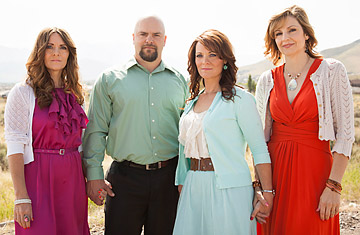
Joe Darger with his three wives, from left, Vicki, Val and Alina. Vicki and Val are identical twins.
Before judging Alina, Valerie and Vicki, the three wives of Joe Darger, try the experiment Joe Henrich offers his college students in his evolutionary-psychology class at the University of British Columbia. Imagine, he says, that you have to choose between two potential spouses. You feel the same about each. Each cherishes you. Lover A is a regular, middle-class individual. Lover B is a billionaire, the kind with time and money to spare. The caveat is that Lover B is already married and wants to add you as a second spouse, which for the purposes of this experiment is completely legal. Which would you choose? "Seventy percent of the women said they'd be willing to consider being the second wife of the billionaire rather than the average guy's first wife," says Henrich. "Only about 10% of the men would consider it if the scenario were reversed."
It's a completely unscientific test, but even so, the results are a little jarring. A majority of this sample of young, educated Western women would at least contemplate marrying the billionaire bigamist. Doesn't this fly in the face of decades of laborious cultivation of women's power? Doesn't it run counter to the classic love story of boy meets girl and they live happily ever after? Isn't it just weird and cultish?
Proponents of defining marriage as a union between one man and one woman have long argued that if we entertain variations on that theme, like gay marriage, the institution will soon become unrecognizable. "If you think it's O.K. for two [men to marry], then you have to differentiate with me as to why it's not O.K. for three," said former presidential hopeful Rick Santorum on the campaign trail, echoing a common refrain. Even though there's no historical precedent linking one to the other, growing public support for gay marriage has nonetheless gladdened the hearts of polygamists. "If people are open to gay marriage, it impacts on how they look at plural marriage," says Darger, who lives with his three wives and 18 of his 23 children in Herriman, Utah, about 25 miles from Salt Lake City. "You can't talk about gay marriage and still criminalize us for who we love and how we organize our families."
Close observers of the marital topography are noticing a shift in attitudes toward polygamy and its sister wife, polyamory, which can roughly be defined as having multiple lovers by mutual agreement. Partly this is a result of a decades-long wholesale rethinking of the institution of marriage and who society and the courts say can engage in it. But it's also a result of more exposure to polygamous lifestyles. Some polygamists, sensing unsteadiness in the big ship monogamy that has always blocked their passage to the oceans of normality, are trying to navigate their way to validation of their version of family.
